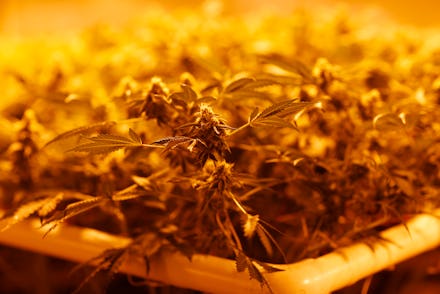If Anyone Tells You Marijuana Is a Gateway Drug, Show Them This

One of the most common arguments about drug use is that marijuana is a gateway drug. Some claim smoking weed puts young people on a slippery slope to other hard drugs like cocaine, heroin or amphetamines. Drug warriors often cite this idea when arguing in favor of continued marijuana prohibition.
But how strong is that argument really?
The Treatment4Addiction used data from the 2012 National Survey on Drug Use and Health to track how people progress from one drug to another. Select a particular narcotic on the left, and the chart, found below, tells you what percentage of people tried any particular drug before and after that one.
The results provide an interesting look at the gateway model's limitations.
According to the chart, approximately 60% of pot users go on to try other drugs and mind-altering substances, and in that sense it does appear to be a gateway drug. However, as the Atlantic's Olga Khazan points out, that argument becomes much less powerful once you consider the fact that 88% of drug users in the infographic began with alcohol.
As Khazan notes, while about half of drinkers go no further than alcohol, only about 40% of marijuana users stop at ganja. But alcohol works as a fairly efficient way to shuttle drinkers into marijuana use, with approximately a third of drinkers deciding they would like to try pot next.
Furthermore, playing with interactive reveals a variety of gateway behaviors, with totally legal alcohol being the biggest culprit. So while marijuana can theoretically lead to other drug use, these numbers conflict with the idea that marijuana has intrinsic "gateway properties," as well as arguments from anti-drug campaigners that marijuana legalization will usher in an unprecedented era of drug addiction.
The "gateway hypothesis": Despite warnings from organizations like Drug Free America Foundation, a similar argument against the "gateway hypothesis" has existed for several years.
A 1999 Institute of Medicine publication titled Marijuana and Medicine: Assessing the Base Science similarly argued marijuana is really only a de facto gateway drug because it often comes before other illicit drug use.
The report more explicitly notes, "But because underage smoking and alcohol use typically precede marijuana use, marijuana is not the most common, and is rarely the first, 'gateway' to illicit drug use." So if they wanted to pursue the gateway hypothesis model to its logical conclusion, anti-drug campaigners should focus on keeping kids off of beer and cigarettes.
The real gateways: In other words, the process by which a clean person becomes a drug user often begins long before they touch their first joint. This hypothesis was echoed in a 2012 American School Health Association study that found alcohol was the most likely to be the gateway drug of choice for 12th-graders.
Another 2012 study looked at heroin users in Japan, "where cannabis is used by only 4.5% of the 18- to 29-year-old population, while use of other illicit drugs is 4.8%, cannabis is not used first by a staggering 83.2% of the users of other illicit drugs."
As Newsweek's Miriam Boeri writes, meaningful data that could validate the gateway hypothesis on marijuana is seriously lacking. Meanwhile newer research emphasizes the roles poverty, the social environment, mental illness and criminalization play with respect to drug abuse and addiction.
Or, as Khazan writes, "Marijuana isn't a 'gateway' to harder drugs in the same way that ordering an appetizer isn't a 'gateway' to an entree: One comes before the other, but you're eating both because you're already at the restaurant."
Why you should care: With the majority of the country now in favor of outright legalization of recreational marijuana, a sharp shift in the way Americans look at weed is well underway. But it's not there yet. Powerful politicians like New Jersey Gov. Chris Christie continue to rail against drug law reform, while in most states marijuana can still land users in serious trouble. Even in states where marijuana is legal, pot smokers can still run into obstacles like being kicked out of their housing, fired from their jobs or losing unemployment benefits.
Challenging the conventional wisdom on marijuana is important. Ending the prohibition on marijuana across America will require more than simply appealing to politicians' good will. The simplistic narratives used to justify the wasteful war on drugs, with all of its deleterious effects on communities and health, are inadequate for a country that deserves better than platitudes and rhetoric.
The country needs to stop thinking about the gateway of marijuana to other drugs, and start thinking about the gateway to reasonable thinking.